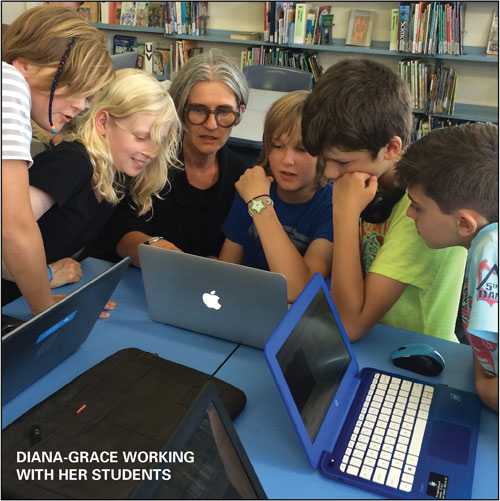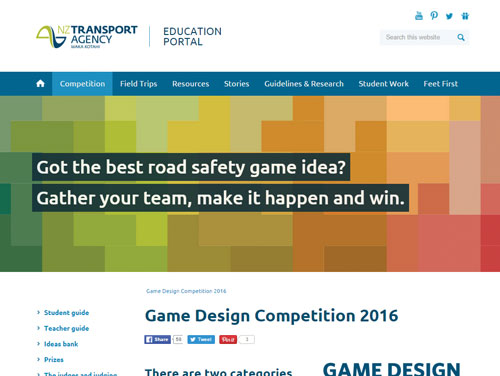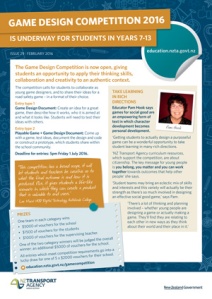The following post has been copy pasted straight from Interface Online Magazine
Game design creates collaborative ‘hum’
February 10, 2016 by paul548if
 Wellington teacher Diana-Grace Morris makes time for her students to design games in class because it fosters a unique interaction among them she doesn’t see in any other learning activities, writes Wayne Erb.
Wellington teacher Diana-Grace Morris makes time for her students to design games in class because it fosters a unique interaction among them she doesn’t see in any other learning activities, writes Wayne Erb.
There is an energetic rise and fall of sound when a class of Year 7-8 students work together to design games, says teacher Diana-Grace Morris.
“When students are creating games, the classroom soundscape moves quickly from silent to slow talking, then to loud, fast talking. Then it drops down to silent and re-loops. I refer to this soundscape as the ‘hum’ and it reflects a real learning hum that is going on.”
Diana-Grace is Assistant Principal at Ridgway School in Wellington. She blogs and tweets about future-focused learning and is in the reference group of teachers for the NZ Transport Agency’s Game Design Competition (see sidebar).
Process of creation
She believes game-based learning can promote ‘strong collaboration’ amongst students – something that is evident both in the outcome and during the process of creation.
“When my students make a new game, they are creating something that they could not create on their own, and to get that result, there is tension in the group – a lot of it. We need our students to experience these tensions, as that is when students are busy putting their key competencies into play.
“So, in order to move towards strong collaboration, you need to plan for how the key competencies can be firmly anchored into the teaching and learning process.”
Diana-Grace says learning within a key competencies frame gives the class a way to explore future-focused learning. This focus can emerge through thinking and doing things in such a way that learning includes not just what a student knows, but what they can do with what they know. Collaborating with others is often critical to providing such rich opportunities for students.
Collaboration observed
During game design lessons, Diana-Grace has seen her students
- highly engaged with the game design process;
- negotiating different social/friendship groupings;
- moving around the classroom to check each other’s work;
- playing each other’s games and giving fast, critical feedback;
- improving their game design quickly as they gain feedback and build their understanding of what makes games work well; and
- keen to support others in learning coding skills to achieve a particular functionality.
For more from Diana-Grace see her blog at exploriosity.blogspot.co.nz
Certainty and uncertainty
“After seeing the games my students are creating, and the experiences they have had with social good games, I think it is possible for game-based learning to be a vehicle for thinking about the present and future differently,” she added.
“For myself, to teach, act, and think differently requires the teaching and learning space to oscillate between certainty and uncertainty.
“The apparent certainty of curriculum knowledge gets applied into a variety of certain and uncertain spaces. An uncertain space might be a context that the class has not previously understood, where we are unsure what to do, but this uncertainty provides an opportunity for new learning to take place.
“I create spaces for my students to design games in class because I observe the students relating to each other in ways I haven’t seen or heard in other learning experiences.”
Wayne Erb is a freelance writer.
Game Design Competition 2016
 Got the best road safety game idea? Gather your team, make it happen and win!
Got the best road safety game idea? Gather your team, make it happen and win!
Organised by the NZ Transport Agency, the Game Design Competition 2016 is open to Year 7-13 students and runs through Terms 1 and 2. It provides an authentic context for students to design digital or non-digital games about road safety.
There are two categories:
Game Design Document
Or Playable Game + Game Design Document.
Entries are by teams of three or more. The competition website includes game design tasks linked to curriculum resources across several learning areas.
For more see centre pages or go to education.nzta.govt.nz/gamecompetition
or download it here Education Portal News – Issue 29 PRINT



No comments:
Post a Comment